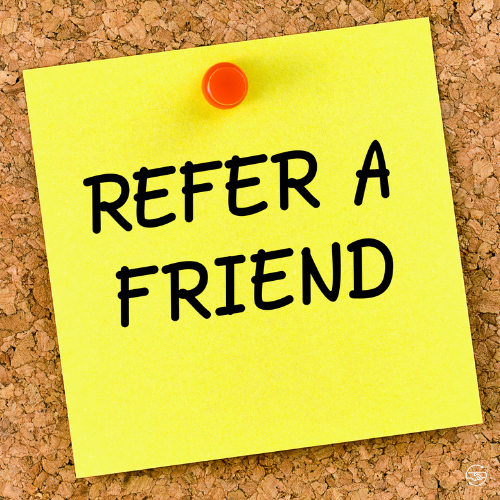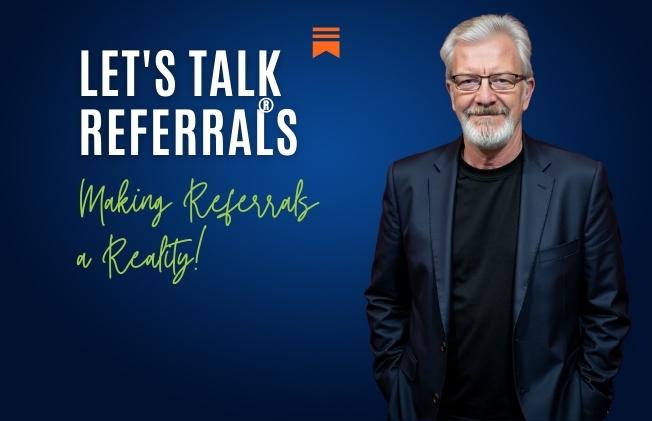Get More Referrals From Your Customers
Get More Referrals From Your Customers
If there’s one thing small businesses need in greater abundance, it’s more customers. But there always seems to be a balancing act between serving your current customers and keeping a steady stream of prospective customers “waiting in the wings.” If you get that balance right, you’ll enjoy a steadier income and a greater reputation.
Of course, if you get that balance wrong, you could wind up with peaks and troughs where you have periods of less work and less profits, followed by periods of “no time to breathe” non-stop work that leaves you feeling stressed out and overworked.
That doesn’t sound like a good place to be.
So the question is, how can you maintain that balance, so that you can have a predictable flow of new business?
One of the best ways is to cultivate relationships that turn into an endless stream of customer referrals and being the best small business in your industry will help. But like most things, getting referrals on purpose requires a bit more planning.
As simple as it sounds, the best thing you can do is to be the kind of person everyone wants to hang out with.
Now obviously, some of this is just your personality. You need to make the most of the personality traits you already possess, so that you can attract your ideal customers. People want to do business with people they know, like and trust and the “like” bit is important.
Your ideal customer is the target market you truly want to attract. Who would you rather work with? Someone who needs your products or services, and right now? Or would you rather spend time on talking with people that will never buy from you?
Your business will be a lot more fun if you’re working with people that need what you’re selling because it won't feel like selling anymore. They will be just about ready to sign on the dotted line and they’ll be happy doing it.
The True Secret to More and Better Referrals
You simply need to ask.
Think about that for just a second.
When is the last time you actually said to a current or past customer, “Do you know anyone who would benefit from my products or services? Could you give me a referral?”
Okay, I wouldn’t use that phrase exactly, but the chances are you’ve never said it, or only done it infrequently because it doesn’t always work. In fact, if you do say it like the example above, I’m pretty sure it won’t work. It’s also the kind of thing we don’t naturally think about doing, or if we do think about it, it makes us more than a little uncomfortable.
And if you’re saying to yourself, “I do ask! It’s on the bottom of every invoice/in my email autoresponder/on my business card!” Stop right there. That’s not the answer. Most people aren’t reading them.
What we’re talking about here is not an added line in an email or filler on a business card. I’m talking about true human interaction, and when you get this right, you’ll get more customers through referrals.
There are a few “rules” to follow when asking for this kind of referral:
- Don’t ask when you’re presenting an invoice
- Always ask in person if you can, or on the phone at the very least
- Ask repeatedly, but don’t be a pest
- Make it easy for customers to refer you
If you can make these four points part of your referral system, your customers will begin referring people they know to you. Okay, not everyone will, but some will and that’s probably more than you’re getting right now.
But before you start asking, there’s one thing you need to do…
Create a Referral Ask Script
Most of us are not born sales people.
In fact, it can make us uncomfortable. And asking for referrals is very similar to asking for the sale, so you may find yourself:
- Speaking hesitantly
- Lowering your voice
- Unconsciously changing your body language
- Or not asking at all

You probably don’t even know you’re doing these things, but they have a definite impact on the way your request is perceived and therefore, on the results.
A script will help because when you know exactly what you’re going to say, and you’ve practiced it multiple times, it will sound more natural and engaging, and it will get you better results.
Your script doesn’t have to be salesy or weird sounding. In fact, it shouldn’t be. It should quite simply be you, but confidently. It also shouldn’t be long. More than a minute and you’ll start to sound desperate, and desperation drives people away. It’s kind of like an elevator pitch, but with referrals in mind.
Here’s a sample script you can start with:
Hey [customer name], it's been great working with you. I'm really focused on helping a lot more people this year, and referrals are the best way to connect with people like you who truly need our services. You know firsthand how we operate, so if you know someone like [example of ideal client], would you be able to introduce us.
It’s simple and straightforward, won’t make people uncomfortable, and gives your customer the perfect opening to say, “Yeah, my friend Joyce is a [ideal customer], and just the other day she said she didn’t know what to do next. I know you could help her!”
When your customers can see exactly how you could help a friend or colleague, they’re going to do the groundwork for you. So not only will you get the referral, but your prospective customer will already be “pre-sold” on working with you.
You will want to practice your script, and while you might think practicing will make it sound stilted and artificial, the opposite is actually true.
Practicing your script until you know it backwards and forwards will allow you to be natural and authentic. You’ll be able to respond thoughtfully if the conversation takes a turn, and recover quickly if you get interrupted. In short, the more you practice, the less you’ll sound like you practiced.
Your “script” is also a living thing. Just like you tweak and test your email autoresponders, you will want to do the same with your script. Pay attention to your customer’s body language as you talk to them. Do they disengage or become distracted every time you mention some things?
Remember these important points when speaking to your customers about a referral:
- Be animated and excited: Speaking in a monotone or rushing through your script is a sure sign that you’re uncomfortable.
- Smile: Even if you’re speaking to your client on the phone, a smile can (literally) be heard in your voice, so remember to smile when you talk.
- Stand: This is especially true if you’re on the phone. Standing will automatically make your voice more powerful and engaging. Make it a habit to stand up when talking on the phone and you’ll see the difference in your voice.
One word of caution, though, when it comes to asking for a referral: don’t be pushy. That should go without saying, but it’s important, so let’s just say it.
You shouldn’t accept just any referral. Not everyone is a good fit for you, and you’re not the right person for every situation. Being able to spot referrals that are less than optimal will save you much time and trouble down the road.
Follow Up
Humans are forgetful creatures.
That’s why we have calendars and to-do lists and apps like Evernote, because “out of sight” really does mean “out of mind” in most cases.
Your referral request is not immune from forgetfulitis, so it’s important for you to have a plan to follow up.
Make a note in your calendar as a reminder, or if you’re using a CRM system, you can add the information right to your client contact record, and even automate it.
Just like in sales, it takes several “touches” to cement the deal. Getting referrals is very much a matter of making it a point to both ask, and remind.
Make it Easy to Refer to You
While it’s always better to ask for referrals in person or on the phone, it’s also important to make it easy for customers to send people your way. A click to forward an email or an extra business card are easy ways for your customer to make a quick introduction.
it easy for customers to send people your way. A click to forward an email or an extra business card are easy ways for your customer to make a quick introduction.
The key here is to always be in a referral mindset. Carry extra business cards and always give two or even three, never just one.
These tactics are no substitute for personal interaction, of course, but when added to your overall referral plan, they can be just what your customers need to take action.
Here’s another option to make it easy: consider offering a referral fee. Call it a “refer a friend” incentive, or just a finder’s fee, the promise of a small gift (monetary or otherwise) can help people to remember you when the subject of what you do comes up.
Whatever your incentive, referral rewards can be just the push your customers need to remember you next time someone asks, “Do you know a good {whatever your profession is}?”
Make it Part of Your Small Business Routine
Make the asking for and follow up a part of your regular referral marketing routine. Incorporate it into your checklists and create reminders for yourself or your team. One small business I know uses a checklist with every customer to make sure they remember to ask for referrals, as well as all the other things that need to be done with that customer.
Once you’ve really incorporated asking for referrals into your daily or weekly marketing routine, it will become second nature.
Remember Your Please and Thank You's
Getting a referral is not the end of this relationship, and the small business who believes it is, will be far less successful for it.
Make no mistake about it, this is more than just “business,” and loyalty and gratitude are the keys to long-lasting, mutually beneficial relationships.
Remember, that by offering a referral, your customers are expressing a much higher level of trust in you than they do by paying you. Even if they’re your best customer, spending thousands of dollars with you regularly, sharing you with they’re friends is much different. Now they’re telling others that they trust you, and that they should too.
They’re putting they’re reputations and maybe even they’re personal and professional relationships on the line, and that deserves a great deal of thanks on your part.
We’ve already talked about offering a monetary incentive, and that’s important, but don’t ignore the personal touch.
Send a Handwritten Thank You Card
Sadly, this is a lost art, but it can be so empowering. Sending a thank you note or card shows that you value your customer and you value the trust they have placed in you with their referral.
Send a Small Gift
This doesn’t have to be elaborate or expensive, but it does have to be personal. Find something that your customers will value, even if it’s not “valuable”. I would recommend not branding it, but the thank you card or note that accompanies it could be branded. Or, if you really feel the need to brand something, make it inconspicuous.
If you want to take it to the next level, and this may be more difficult with a small business that has a lot of customers, make a note on a customer’s file, or in your CRM, what kind of gift would be appropriate for them.
Make a Charitable Donation (in their name)
For some people, giving back is a huge part of their lives. If that’s your customer, the chances are they would be truly moved by a donation to their favorite charity. You get to do a good deed, plus you can thank your customer in a way that means the most to them. It’s a true win/win for everyone, including the charity.
Become a Referral Machine
Whether you prefer to think of it as karma, or just know that because of the law of reciprocity, referrals do have a tendency to multiply. The more you give, the more you’ll receive. So make it a point to refer others back to your customers as well. Perhaps one of your customers has a small business, or works for a company that you are able to refer to.
Become a Connector
In his book, “Love is the Killer App,” Tim Sanders makes the point that if you connect enough people to one another, they’ll reciprocate by connecting you to people they know.
Nowhere is this more apparent than in the local community.
Local business networking groups (such as BNI) offer a great opportunity to network with other small businesses who are a part of your local community. Also, consider joining your local Chamber of Commerce. When you participate in these types of organizations, over time you will develop a consistent flow of referrals to your business.
However, people are forgetful.
You have to make it a point to follow up with people you meet. A quick note, a thank you card, an email, or a phone call are all easy ways to stay in touch and remind people who you are and what you do. Not only that, but following up will even help you remember those you meet, so next time you’re chatting with someone who is looking for a web designer, you can easily say, “Oh, I met Debbie Designer at a conference just last month, and I think she’d be perfect for your project. Let me send you her contact info.
These types of connections are what fuel the referral machine, so take the time to gieve to others, and it will come back to you in the form of more (and better) customers.
Keeping your customer pipeline full is critical to your business success. While you don’t want it so packed that you have no time to think, you do want to have a steady stream of new and returning customers so that you can know without a doubt what your profits will look like from month to month.
By taking the time to put your systems in place for following up, and to practice giving to others through referrals and connections, you’ll soon earn a reputation as the go-to small business in your industry.
Links
- Local BNI Chapters Forming
- How to Join BNI in South Central Texas
- Upcoming Events
- All Texas BNI Chapters
- Find a BNI Member
- Advanced Chapter Search
- Networking
- Networking Etiquette
- Networking in Corpus Christi
- Attending Networking Events
- BNI for Insurance Agents
- BNI for Realtors
- Networking in Laredo
- BNI for Health & Wellness Professionals
- Networking & Referrals in Victoria, TX
- Networking and the Trades
- Cold Calling vs Referrals
- Your Local Chamber of Commerce
- Get More Referrals
- Local Networking Events
- Corpus Christi
- Get More Customers
- Professional Networking
- Online Networking
- How Much Does BNI Cost
- The Power of Professional Networking in Growing Your Business

